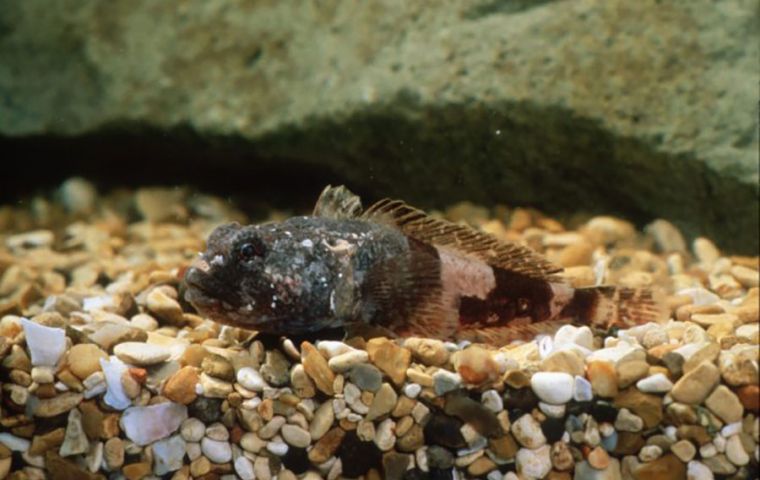MercoPress. South Atlantic News Agency
Antarctica project financed by UKRI to unlock life's secrets in extreme cold
 Antarctic plunder fish, or Harpagifer antarcticus, from Signy Island. Credit Chris Gilbert
Antarctic plunder fish, or Harpagifer antarcticus, from Signy Island. Credit Chris Gilbert Cambridge researchers are set to explore the uncharted depths of life in the extreme cold, with findings that could reshape our understanding of biology and pave the way for future scientific breakthroughs.
The initiative, a collaboration led by British Antarctic Survey (BAS) with the Department of Chemical Engineering and Biotechnology (CEB), will develop novel microscopy techniques to observe living cells at subzero temperatures – a feat never before achieved.
The project was announced this week as part of UKRI’s new interdisciplinary scheme, and is one of 36 projects that will share £32.4m from the first round of UKRI’s new cross research council responsive mode pilot scheme, designed to stimulate exciting new interdisciplinary research.
The team aims to study dynamic live cell imaging at sub-zero temperatures, to break new ground in fields such as biotechnology and climate science. The research holds the potential to open up entirely new avenues of study, and offer insights that could have far-reaching implications across multiple scientific disciplines.
“By exploring the uncharted territory of cold biology, we are not only advancing science but also addressing some of the most urgent challenges of our time,” said Professor Melody Clark, joint Principal Investigator from BAS. “This work has the potential to reshape our understanding of life and its resilience, offering hope in the face of global environmental change.”
“Understanding how life functions in extreme cold is not just a scientific curiosity; it’s a necessity in the face of the accelerating climate crisis,” said Clemens Kaminski, Head of Department at CEB and joint Principal Investigator of the project.
“Our research will provide crucial insights into how organisms survive in some of the harshest environments on Earth, which could help us protect these ecosystems as they face unprecedented threats.”
The focus of the study will be on proteins, which are essential molecules responsible for various cellular tasks. Although protein behavior is well understood at higher temperatures, much remains unknown about their function in extreme cold. This research aims to bridge that gap by examining Antarctic species, such as the fish Harpagifer antarcticus, using specially adapted imaging tools for cold environments.
“The interdisciplinary nature of this project – spanning biology, physics, engineering, and chemistry – underscores its potential to make far-reaching contributions to science,” added Kaminski. “By developing new technologies to study life at subzero temperatures, we are opening doors to discoveries that could have profound implications for everything from conservation efforts to medical advancements.”
As the polar regions warm and biodiversity faces increasing pressures, understanding life in these fragile environments becomes ever more critical. The findings from this research could inform strategies to mitigate the impacts of climate change, preserve biodiversity, and even guide the development of new biotechnological applications.
When awarding the project with funding, the UKRI were impressed by the strength of the team in working together to produce an ‘exciting, boundary-pushing’ proposal as well as impressive preliminary studies underwriting the success of the proposed work. The panel noted the previous attempts to receive funding for the project, which had proved difficult due to the inter-disciplinary nature, but felt it is a ‘timely and urgent proposal given climate change’.




Top Comments
Disclaimer & comment rulesCommenting for this story is now closed.
If you have a Facebook account, become a fan and comment on our Facebook Page!